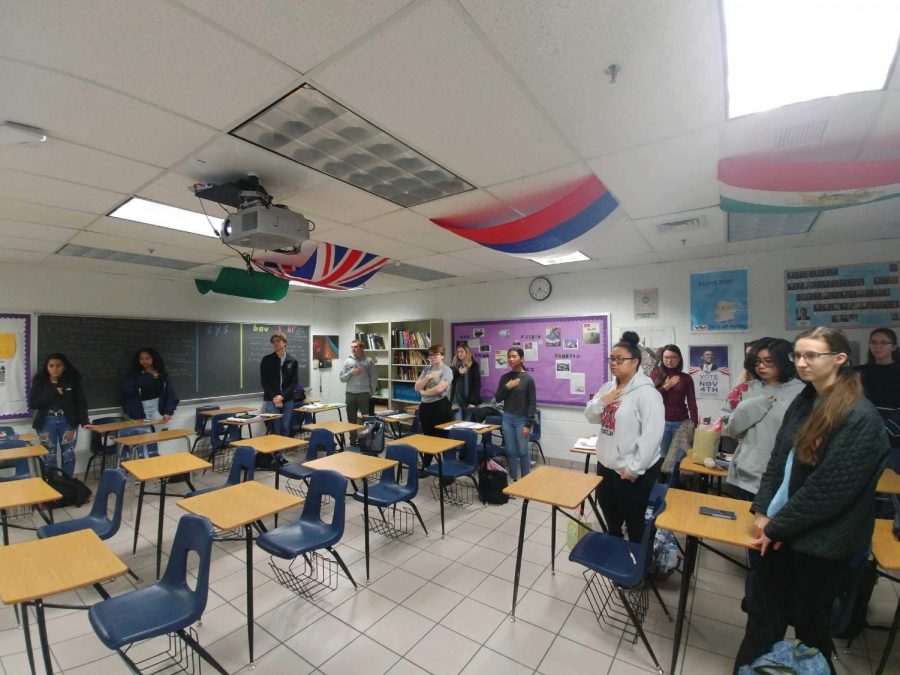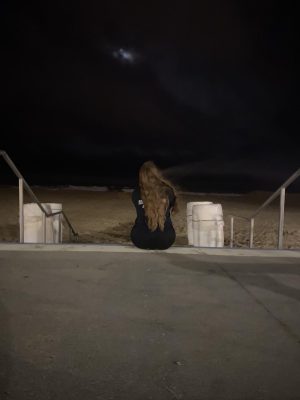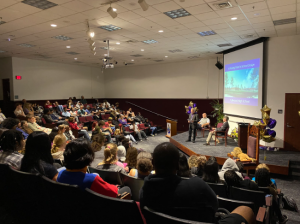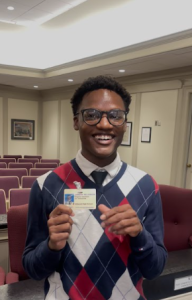What it means when students sit for the Pledge
December 12, 2018
Upon moving to the United States and beginning my journey as an American public school student in the sixth grade, I was confused but excited to memorize the Pledge of Allegiance and recite it everyday in school. The experience was one that was new to me, one I didn’t question, and an opportunity to express love and respect for the country that granted me freedoms and opportunities I’d never gotten to experience while living in the Middle East. Over time, however, after repeating the same routine everyday year after year, watching other students stand halfheartedly, some half hunched over the homework they’re desperately scrambling to finish, weakly mouth the words, or simply not bother saying them at all, I began to question the tradition and what exactly it meant to everyone. Then, with the recent controversies over the Pledge of Allegiance, and as I and my peers became much more acutely aware of the serious issues that plague American society, the Pledge of Allegiance suddenly became something more than a chore of our daily routine; but although many students’ perceptions were shifted, they were shifted in dramatically different ways, varying from one individual to another.
Approximately 80 percent of surveyed Tallwood students stated that they stand everyday for the Pledge of Allegiance, but there was immense variation within students’ explanations for why and the conscious choices they make about what they do while standing. Some students explained that while they stood, they chose not to put their hand over their hearts or say the words. The majority of students who said they stood for the Pledge stated that it was about being about respect for their country and the military, with many explaining that the have family members in the military that they want to respect by standing.
“[I stand] mostly because of my military affiliation with my father. I need to give him and the rest of the military community my utmost respect, and I do that through standing,” stated Francis Sarabia, Senior.
This was a fairly typical answer amongst those who said they stand for the Pledge. Many of the rest of the students who said they stand stated candidly that it had simply become a mere habit that they didn’t think much about.
“I’ve always stood, so it’s kind of a force of habit,” stated Dystini Hatton, Tallwood senior.
Another common response among students who stand for the Pledge was that they merely stood out of obligation and peer pressure, stating mostly that they felt they were judged if they remain seated.
“I think [the Pledge] is stupid. No other country does it. My stepfather is a United States veteran with PTSD and other problems from war, and he also agrees that the Pledge of Allegiance is not necessary. I think pledging your allegiance to a country can show nationality, but to me, I don’t respect a lot of America’s values, so I don’t choose to say the Pledge of Allegiance….I stand because everybody else does, which contradicts my ideas, so it’s more egotistical,” admitted Rebecca Brown, Tallwood student.
Other students revealed that they also stood despite their contradicting beliefs, but it was instead because they had outrightly be confronted or gotten in trouble for sitting during the Pledge.
“I stand because I’ve gotten criticism by my teachers and classmates for not. I’ve been pulled out of class and asked why I don’t stand and I got tired of it, so now I do,” revealed an anonymous Tallwood student.
Other students admitted to having witnessed similar occurrences in which teachers have gotten blatantly upset and chastised students for sitting. Ms. Gibson, Tallwood government teacher, stated that although she fundamentally believes in saying the Pledge of Allegiance, she disagrees with teachers who act this way and she understands and respects students’ choice to sit, and believes that they absolutely have the right to do so.
“A colleague of mine in another school has shared with me that she is not comfortable with students who don’t stand for the pledge,” stated Gibson. “She actively tries to convince students to stand and if a student does not, she refuses to write a letter of recommendation for college or scholarships based on that action alone. I absolutely disagree with her policy.”
In the Supreme Court case West Virginia Board of Education v. Barnette (1943), the Court ruled that students can’t be forced to recite the Pledge of Allegiance against their will or be punished from abstaining. The Virginia Beach City Public Schools policy is consistent with this ruling. Students and teachers alike, as long as they are not disrupting others from saying the Pledge, absolutely have the right to abstain from standing during and saying the Pledge.
Approximately 20 percent of surveyed students reported that they exercise this right; however, once again, their reasonings behind doing so was varied.
“I just don’t feel like we’re a united republic. Period, point, blank. I’m not going to stand for something that doesn’t exist. Although that does not mean that I don’t wish for it, I do, but it’s still discouraging, I guess. Sitting is a form of silent protesting, which I choose to partake in,” explained Tallwood senior Francine Williams.
Tallwood government teacher Ms. Gibson also admitted that she does not believe the United States currently lives up to all the ideals present in the Pledge, but nevertheless holds a different perspective that influences her choice to stand and say the Pledge each morning
“For me, when I say the Pledge, I am reminded of love for my country and the principles upon which it is founded. That we live in a representative democracy, a republic, and the promise of the US constitution is what I think about when I recite the words. I believe the Pledge is both inspirational and aspirational. Do we as a country fall short of some of the ideals? For example, the phrase ‘liberty and justice for all?’ Yes, we do. However, when I recite the words, I consider them an affirmation of what we are working toward.”
Some students displayed clear frustration towards those who held differing opinions than them.
“The Pledge is to honor the sacrifice and history made by those who founded and established this country. To sit during the Pledge is like to spit on the graves and the lives of those who suffered to become citizens, to make it back alive from war and beg on the streets in order to become someone as an American. It’s an insult to the life of a black soldier who was nearly killed during the Civil War, bleeding out and half alive, but still holding that American flag so it never touches the ground. How would that man who is fighting for the right of freedom, for the real America, the one that’s lead by God and justice, feel about those who burn the flag he struggled to keep from being desecrated? The spit on his fight for equal opportunity that everyone now has. Sitting and kneeling is your God given right that was fought for by these people, don’t use your rights disgracing those who actually earned that change for you to be so entitled,” argued Nataniah Guzman.
However, some students wanted to make it clear that by sitting as a silent protest, they are not disrespecting their country.
“I sit because, not just in today’s political climate, but especially today’s political climate, there’s a lot of things that aren’t liberty and justice for all….I feel like as African Americans in America we don’t get treated equally, so why would I stand for something that I believe is a lie? It’s not out of disrespect, it’s not like I hate our country or disrespect our troops, because I have people in my family who are in the military, but I feel like if they serve our country and then they come back and don’t get the equal treatment, who’s really being more disrespectful?” Explained Lauryn Lynch, Senior.
Many students expressed similar grievances towards those who sat, arguing that these students were disrespecting their country and those who fought for the United States in the military. Others stated that while they absolutely respected students’ right to sit, they believed that students ought to have a good reason to do so.
“I think that if people know what they are protesting then they have every right to sit, but someone who sits and doesn’t know what they’re protesting is just lazy and ignorant in my opinion,” expressed Dylan Loughheed.
Despite this, not every student who sits during the Pledge is engaging in an impassioned act of protest. Some students expressed their general indifference towards the Pledge, and how they simply did not feel the need to stand.
“I could go on about how I am upset with the current political climate, unhappy with the the way our current society treats minority and marginalized groups and disgusted by the (what I feel is) rampant corruption of the current cabinet. Which is all true but, I’d be lying if I didn’t admit a large portion of why I sit is pure laziness. I’m not playing games that early in the morning,” admitted another anonymous Tallwood student.
“I feel the Pledge takes away from time I could be using to prepare for class, so I prepare for class instead of standing,” added an additional anonymous student.
While some students stated that they felt the nationalism and pride it instilled in citizens was something good and necessary, other students admitted that they find the Pledge of Allegiance somewhat odd and did not understand the point of it.
“I think it’s a bit odd that we all have to stand up and pledge our allegiance to the country. I’m not fully informed on this, but aren’t we the only country who does it? While I find it unnecessary, I also don’t take offense to it, but I can understand why others would,” stated Loughheed.
“I respect it; however, as I have grown older, I have begun to think that it brainwashes the American people (including myself). I understand that it is a sign of unity for the diverse populations in the US of A; it’s just become one of those enigmas to me,” added Francis Sarabia.
As far as grievances and protests go in regards to the Pledge, students were largely unspecified in their explanations of their complaints, with most stating merely that they did not feel everyone was treated equally and the nation isn’t truly united. Religion and the issue of the separation of church and state was one of the most common complaints about the Pledge that students actually got somewhat into.
“I feel like religion and state should be separate, so I don’t think that the ‘one nation under God’ portion should be included,” voiced Amanda Sinues, Senior.
Many students, both religious and nonreligious, brought up this point, but others claimed that they did not have a problem with it, and believed it should be kept in the Pledge.
“I appreciate the Pledge of Allegiance because it is a chance for me to affirm my loyalty to America. I agree with all parts of the Pledge. I understand that many people have issues with the “one nation, under God” portion. However, even though not all people believe in God, that does not change the fact that this country was built on Judeo-Christian principles,” explained Abby Martin.
Despite the fact that this may be true, the Pledge of Allegiance actually did not always contain this controversial piece. In its original form, the Pledge simply read “I pledge allegiance to my Flag and the Republic for which it stands, one nation, indivisible, with liberty and justice for all.” It was not until 1954 that President Eisenhower encouraged Congress to add the “under God” portion in order to fight the secular communist ideals that were seen as a threat at the time of the Cold War.
The Pledge of Allegiance means many different things to many different people, and opinions on it within the Tallwood student body are incredibly diverse. Despite some issues and animosities, the array of opinions expressed by Tallwood students and teachers represent part of the beauty of American democracy and freedom of expression. One anonymous Tallwood student expressed that although many individuals may disagree with or not respect some of the issues and occurrences in the United States, holding a certain amount of respect and pride for the freedoms that the United States grants its citizens is vital.
“I stand for the Pledge out of respect for my country and those who have or are serving in battle. It is the least we can all do to show our appreciation, gratitude, and respect for those who have fallen and those who have stood up to protect our rights. I don’t stand to welcome all of America and its faults, I stand to congratulate and recognize what is good about this country. I can leave my protests about what is wrong with this country elsewhere, because I will not disrespect our flag.”
Citations:`
http://www.pewresearch.org/fact-tank/2013/09/04/5-facts-about-the-pledge-of-allegiance/












Taneshia • Sep 23, 2022 at 7:46 am
No matter who you are you have the right to choose.in the case of the school board v.barnette a child could not stand for the pledge due to religious reasons this is just one case.As an American born and raised my mom aunt and 3 uncles served in the army and for that I sit and show respect in silence because as my mother said,”There are so many different ways to show respect without standing and reciting the pledge.”Furthermore as a black women in america life is harder than it should be i respect those who served,are serving,and will serve however they are serving a nation that is corrupt and needs guidance.
Alison • Apr 9, 2021 at 2:07 pm
I love the ideals of the United States of America, but they are not being upheld at all currently. It is for this reason that I do not stand. Social pressure to stand for a nationalist pledge directly goes against the enlightenment ideals on which the USA was built: freedom to make your own decisions, rights to life and liberty, and the constitutional rights to protest and speak our minds. Whatever your reason, stand if you want. Sit if you prefer. You don’t need a reason to do either one. The only thing I have a problem with is forcing others to sit or stand. I don’t mind when people ask me to stand, because I either will agree that their point is valid or I will disagree and continue to sit. The problem arises when it is forced, or when I am asked to leave the classroom for sitting. This is ridiculous and has happened to me and many others in my state.
Additionally, when people make the argument of respecting veterans: I respect veterans without supporting the military. I respect the bravery and sacrifice of individuals. Reciting the pledge of allegiance does nothing to help these individuals, and I do not support war in any sense. If you want to support veterans, thank them personally. If you support the military, enlist. I don’t know. I just don’t see how reciting the pledge does anything for your goal there.
Also as a gay person I just can’t stand for the “justice for all thing,” and in light of the BLM movement, I don’t know, it seems like standing and reciting a false promise isn’t helping anybody
Lee Powell • Mar 5, 2021 at 4:38 am
For me, I see the pledge of allegiance as a way to include the fact we force stereotypes, traditions and teachings that aren’t based on what this country says it is. Why would all the people we sent out to war fight for freedom if they couldn’t speak or sit about it? Why would we send our children out to get PTSD, and that’s if they survive. All I see in the media is poison: what we should do. Which it it has always said this: look this way, talk this way, eat this way, walk this way. Look at the LBTQ+ community. Why should they support America, who outlawed gay (umbrella term) activity until the 50’s. 70 years or so give. Or take. And not even 20 years, the stonewall riots came. Even though we fought hitler who was obviously a cruel man if the gay people at his concentration camps went to America it was still illegal. How is that the pursuit of Life, liberty and happiness? I’m not disrespecting those who have had to go pay the price for the higher ups greed. I’m fighting for them as well as I can. Filtering our lives doesn’t purify, it hates and destroys
Jenifer • Feb 22, 2021 at 5:16 pm
I think and believe you shouldn’t stand for the pledge. As many people have stated (and I will once more) (May I say people of color) Have been treated unequally when the pledge states that they are. In my opinion, it is a lie. America has killed many innocent lives of people of color. My teachers tell me to stand, however that is against the law. They cannot force you to do something you don’t believe in. People had the choice to serve in the Military, they were not forced. It was their decision to fight not ours. Like I have stated and will say once more, I believe you shouldn’t stand for the pledge of Allegiance.
Andrea Lara • Jan 23, 2021 at 5:54 pm
I see both sides, but from 6th grade I’ve made the decision not to stand for the pledge. I’ve felt this way for a while, but I don’t feel like it’s okay to stand for with everything going on. At least for me I was told in school that this is the greatest country but as you grow older you start to see everything.
Aaly • Nov 30, 2020 at 8:21 am
Let me evidently state here, sitting for the Pledge of Allegiance is not a show of disrespect to the military or those who have served. If you stand for the pledge of Allegiance, you are just fortifying your loyalty to the U.S.A. Conversely, if you sit for the Pledge of Allegiance you’re just using your right to freedom of speech, whether you do it out of laziness, or out of silent protest.
Lilian Morales • Aug 28, 2020 at 2:08 am
I think you should stand for the pledge of Allegiance because there fighting for are country everyday and your just sitting down like it’s nothing, and it’s kinda disrespectful for the people that fight hard and put there life in danger just for you so the least u could do is stand for 20 seconds to respect those who fight for are country.
Timothy • Aug 27, 2020 at 12:44 pm
I feel like there are points in both favors. On one hand, the nation is all about freedom of speech. On the other, not standing is disrespectful to the people who have died for the country.
Vienna • Aug 13, 2020 at 3:20 pm
I don’t stand. I’m not disrespecting the troops in my eyes because what if they came back and looked at what they risked there lives for. They risk there lives for freedom and we say we have freedom but yet this country has NEVER been free. And that is why I don’t stand. I’m silent protesting, and I have been for 3 years ever since I could make up my mind and actually realize what is going on in the world. I do not respect American values and I will not stand knowing every word I say is a lie or just makes so many other people uncomfortable. Freedom of speech is allowing me to sit and silently protest.
Mayah Stephens • Jul 22, 2020 at 9:19 pm
After reading this article, and forming MY OWN OPINION on things, I don’t think I’ll be standing for the pledge this year and the years after. America has its ups and downs, but if you research how America has dealt with these downs, you might change your mind about standing as well. I feel America is corrupt, we are trillions of dollars in debt with absolutely no worry, and hundreds of POC (people of color) are being killed innocently every day. This may be a police issue, but Trump hasn’t done anything to solve it. African Americans are treated differently than (may I say white) people. Along with them are LQBTQ+ and women. Yes, women have more rights than they used to, but men are still being played (correct me if I’m wrong) 8% more than women TODAY. So, considering these few things I don’t think I will continue to stand for the pledge. As many children said in the article, I am not sitting out of disrespect as I have military members in my family, I am choosing to sit because of my vision of America and how it deals with the countries problems. Thanks you for listening and I hope you can consider what I said as a reason for your beliefs.
Gabriella • May 16, 2019 at 7:50 am
I go to a public school in Texas in the 9th grade and my teacher doesn’t make me stand because she respects others opinions but my substitute said after I didn’t stand , he whispered to me “ teachers may let it pass but you are supposed to stand for the pledge even if you disagree“ and I think that’s wrong.
Mel Holden • Jan 8, 2019 at 3:47 pm
I graduated high school 40 yrs ago. I don’t understand how “.. one nation, under God…” is allowed in public schools. Isn’t there supposed to be a separation between church and state? if you want your child exposed to religious stuff in school, you send them to a religious school, not a taxpayer funded one.
But I would support this pledge, if it were an option for students/teachers/staff:
A flag with the image of the Earth is flown:
I pledge allegiance to the Earth
And all the life which it supports
One planet, in our care, irreplaceable
With sustenance and respect for all